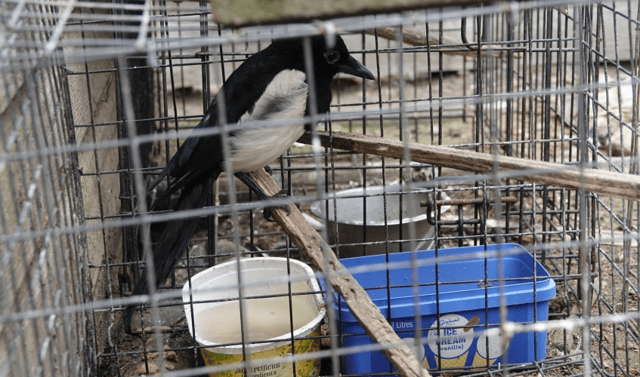Scottish SPCA: Pet ban for man who illegally trapped magpies in his garden


A Scottish man has been banned from keeping pets, after animal welfare inspectors discovered he was illegally trapping wild magpies in his garden.
Penicuik man Alexander Hamilton was last week handed a five-year ban from owning and keeping animals, and was ordered to complete 100 hours of community service after his sentencing, at the Edinburgh Sheriff Court. The 64-year-old had previously pleaded guilty to catching magpies in illegal traps in his garden - causing them distress, while also depriving them of adequate food, water and shelter.
Advertisement
Hide AdAdvertisement
Hide AdScottish SPCA special investigations unit Chief Inspector Mark Rafferty said in a statement that in late July 2022, their animal helpline received a call from a neighbour who had spotted two caged magpies in the man's back garden. "We attended that same day but found no one at home. On looking over the fence into the back garden, we observed a Larsen mate trap and two other cages. The two cages had no suitable shelter, food or water and no visible tag attached to them."
Crow cage traps and Larsen traps are bird traps used to catch members of the crow family - which include magpies, jays, ravens, and rooks - and are most commonly used by gamekeepers or farmers. Inspector Rafferty said they returned later in the day, and Hamilton let staff members into his garden.
"We found a dead magpie lying on the paving slabs in the back garden, just inside the gate." In a screened-off corner of the garden, they found three more traps, he continued. "The first trap was a Larsen mate trap containing one Magpie. The bird was in a distressed state due to being confined within the trap and was in poor condition.
"The second trap contained one magpie and there was also a cage containing a magpie in poor body condition. The magpie within this cage was distressed and managed to squeeze through the mesh on the floor of the cage and enter a space underneath the adjacent shed. The bird could be heard scraping and pecking at the wooden floor of the shed and was clearly distressed," Inspector Rafferty said.
Advertisement
Hide AdAdvertisement
Hide AdAll of the surviving birds were released from the cages and traps, and took off back into the wild, he said. Legally, trap operators are responsible for making sure their traps have a trap registration number from NatureScot - and all traps used must display a tag or sign with this number on it. Hamilton's traps did not have these, making them illegal.
After sentencing, Inspector Rafferty said: "We are pleased with the five-year ban at the sentencing result. All animals should be protected from suffering and this includes magpies. Our team treat these cases seriously and it is good to see that the courts share this view."
The SSPCA and the Wildlife and Environmental Crime Unit would continue to investigate this type of offending, he continued, "to ensure people like Hamilton are caught and stopped from committing further cruel acts".
According to the British Trust for Ornithology (BTO), the distinctive black and white birds are widespread across much of the UK. Magpies were formerly heavily persecuted throughout Britain, but their numbers have grown since the late 20th century as this practice lessened. They are still, however, controlled in many areas, BTO said.
